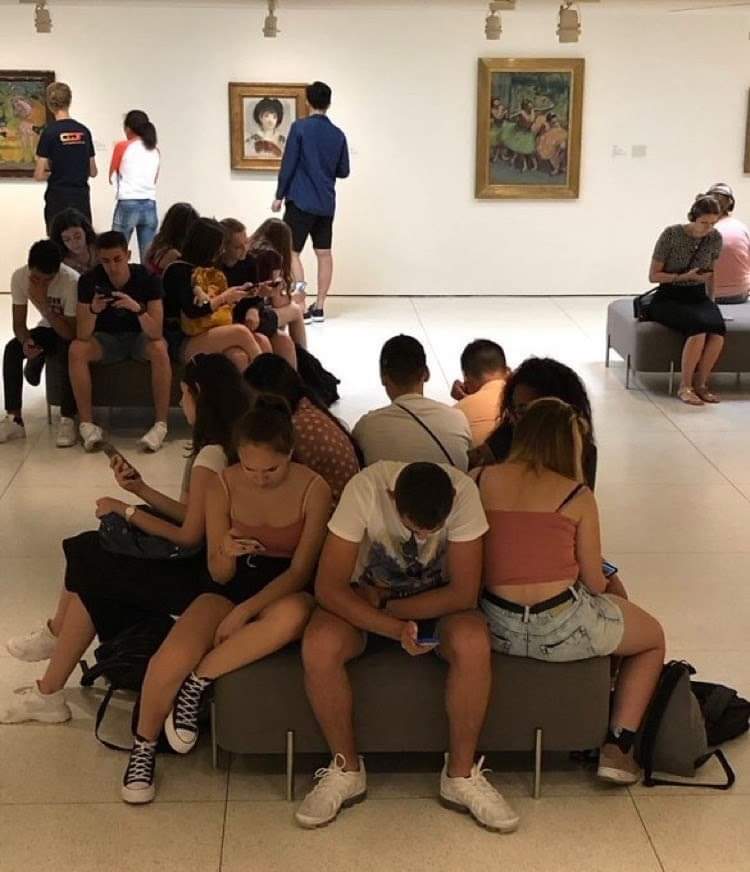
Ofcom’s 2016 report on screen usage showed that people spend more time online than sleeping . This is because, online world is a part of people’s everyday lives. Social networks, news updates, instant messaging, games: internet provides us with constant activity but silently the new age technology is consuming our relationships: my relationship with myself and with family, friends, and society.
Digital dependency in our lives
- It can affect your relationships with friends and family: 40% of people in one study said they felt ignored by a friend or relative whose attention was entirely on their smartphone a day.
- Lack of sleep can lead to health problems, make you moody or reduces your concentration level
- Using smartphones before going to bed can delay your sleep by at least an 2 hours
Consequences of Excessive Screen Time

There are over 200 peer-reviewed research studies have correlated screen time with disorders like ADHD, anxiety, depression, increased aggression, and even psychosis. Besides there are common problems such as obesity, social activities, lack of sleep, speech delays, poor social skills, and investing less family time. Finally it takes a toll on a mental health.
Screens hyper-stimulate kids and create what’s called “mood deregulation.” A screen-tethered, mood-deregulated child would be a child….
- who is moody and throws fits,
- who has attention problems and can’t focus
- who can get aggressive when their devices are taken away.
World has started responding to this cause as an immediate concern. Chinese Health Organization (CHO) has called “Internet Addiction Disorder” as one of the leading medical problems in China, with an estimated 20 million screen-addicted Chinese youth, while South Korea has over 400 tech-addiction rehab centers.
Symptom of Screen addiction in kids

- Your child can’t control their screen use
This is “unsuccessful control,” when children have trouble stopping using devices. Even if parents impose limits on screen time, the child fails to deal with this limiting rule and this is an issue itself.
- Loss of interest in other activities
Only thing that motivates/ interests the child is the screen use. All other items and activities like reading books, listening to music, playing with toys and engaging in sports don’t get them excited at all.
- It preoccupies their thoughts
Even if the child is not using screen, he/she’s talking about screen usage in various ways. Even in a group of friends more time is spent using screen instead of playing, discussing school or simple conversation.
- It interferes with socializing
- Bringing a phone to the dinner table.
- Looking at the mobile even if somebody is trying to make conversation.
- Involved in the cell phone when you are out for dinner, movie, or a family get together or vacation.
- Not interested in a telephonic conversation with family and friends instead run with mobile phone
When screens interfere with family activities, they could be problematic.
- A screen is their mood booster
If your child comes home after a bad day at school and needs a TV show or game to make him feel better or offer an escape, researchers say it could be a sign of screen addiction. - They’re deceptive about it
If your child is sneaking a tablet into bed at night or lying about how long they’ve been playing a video game, this is a red flag.
- Your child shows signs of withdrawal
When it’s time to turn off the TV for bedtime or put mobile devices away for vacation, family get together, or free family time and your child gets frustrated, they may actually be experiencing withdrawal
Role of Parents as a Team
‘Limiting screen time’ is a task which will give best results when parents work together. So, its essential that partners work with each other first. They must have same understanding about setting rules and following strategies to handle this issue. Parents should be united before the house rules are presented before the children.
Various studies have referred that inter parent conflict only expose our children to unregulated usage of screen. Children, whose parents aren’t together, this can be more difficult. So it’s important to be united for the mental well being and health of your child.
Parents are the Role Model
It’s difficult to encourage your children to cut down on the time they spend on screen if they see you constantly updating your Facebook status or checking electronic gadgets. If the focus is to modify their screen time use, its helps the most when you do the same.
Especially telling your children to shut off their electronics while you’re sitting in front/ or with the electronic gadget, isn’t likely to be effective. With older children it will only make them stubborn and devalue any rules which you plan for the family. Children will learn more from what you do than what you say.
Let your children see you make the choice of between checking the score of a game instead of responding to Google/ Facebook/ Whats App notifications. Show them how you have learned to treat media as a privilege
Unplug your child
Think!!!!
Take a moment and think of some of the activities you enjoyed in your growing days and how it would be different today. Don’t let your child miss out on those opportunities.

Younger children
With younger children, it’s easy for parents to suggest family days out or activities together that don’t involve technology. Physical activities such as these not only enforce time away from screens but are beneficial for your child physically and socially as well.
As children get older, their lives become more independent from you. Then it becomes difficult for you to control what they do all the time however you can always encourage them to pursue activities away from their screens,. In such condition a D2 method works the best: Dialogue and Discuss. It is essential to have a planned detailed discussion with them describing:
The activities could be followed are:
Individual activity
- Colouring
- Playing sport/ Making a local sports group
- Learning a musical instrument/ Making a local drama group
- Involve children in some RWA / community activities where they can be can delegated some activities like : cleaning the society on every 2 Saturday. This will result things:
- Give sense of importance,
- Outdoor activities
- Have more social interactions
- Making a plan to call grand parents/ family members on weekly basis to check their health, wishing them on occasions,
How to use D2 method
We must use ‘Dialogue and Discuss’ method to introduce the ‘ House Rule’ for limiting screen time in the family. D2 method is a complete adult to adult conversation instead of an adult to child conversation. The discussion should be not be instructive in nature, where children feel that indirectly they are being told that they are undisciplined, non obedient, immature. Wherein both the parties: parent and children become 2 confronting groups instead of a team. As a result the complete objective of limiting screen time in the family dilutes. So adopt a modified style of adult conversation.
Steps to follow
- Which practices as a parent both of you dislike
- What kind of changes you want to implement
- How do they feel about it (Discuss yes and no situation in detail)
- Include them in making a House Rule Guide
- Also kind of steps will be taken if the same is not followed
Avoid and follow:
- Avoid accusation, blaming,
- Use discussion which could change the situation rather
- Aviod heated arguments
- Have fun in the discussion
- Quote incident when screen time use has hurt you as a parent and also check if children has felt the same some time.
This will help to get parent and children in the same platform and the reason for setting House rule will a want of both the parties.
House Rule Guide
Establish clear rules about electronics
Most children, especially younger teens, aren’t mature enough to handle their electronic gadgets. Establish rules that will keep your teen safe and help your children make good choices with video games, cell phones, TVs, and computers.
*Examples of good rules*: include having a set time when screens need to be turned off at night and removing screens from bedrooms.
Rule 1: Don’t allow electronics during mealtime
Shut off your TV/ electronics gadgets during mealtimes and don’t allow text messaging or web surfing while you’re eating. Instead, use the opportunity to talk about your day. Don’t let screens cheat your family out of this priceless time.
Rule 2: Hold Family Meetings
Schedule a family meeting to discuss screen time use. Allow your teen to give input about the screen time rules. Address problems and problem-solving together. Make it clear that you want everyone in the family to develop a healthy relationship with electronics.
Rule 3: Share list of family chores among child
Make a Family chores responsibility card even if you have multiple help available at home. This helps them to take responsibility and also takes away screen time. However few could be chosen and should be followed diligently. None of these activities take more than 5- 10 minutes a day.
- setting dining table,
- doing bed,
- folding clothes,
- filling water bottle
And add your imaginative rules as well….
Conclusion
There could be various disagreements about the level of severity, definition of addiction however its certainly an alarming stage. As a parent this cannot be just a subject of family conversation rather it should be addressed. In such cases its essential to take help of a coach or counselor depending on the condition of the child.
It’s clear that excessive screen time is damaging our children academically and from both a physical and psychological standpoint. The most worrying part as a parent is , our children are missing many activities which are important in nurturing Human with emotions.
Let’s remember
Every child is unique so as parent’s behavior and the family environment. Hence as a parent we must have a kitty of tools to ‘Limit the screen time’. We parents can teach our children to use these screens as an asset which is a privilege rather than a right that is detrimental.